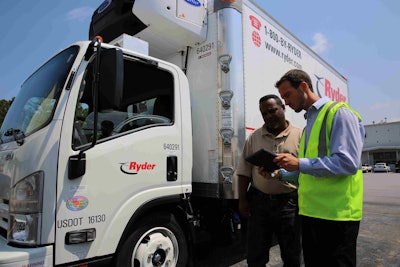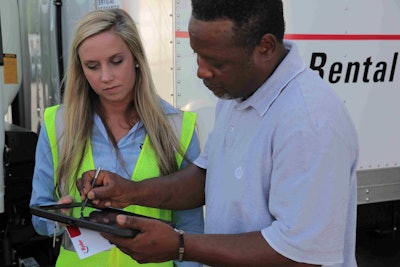
Since its founding in 1933, Ryder has seen plenty of changes in customer needs through the years, especially in the wake of the Great Recession in 2008.
“Our customers’ buying behavior has changed over a number of years. When we really started to see it was after ’08 and ’09, that was probably the biggest transformation that we saw in customer behavior going through the recession and then really into the recovery into ’10, ’11, and ‘12,” Ryder’s rental vice president and global product manager Richard Mohr explained.
First up, to help accommodate the changing needs of their customers during one of the most challenging economic climates in U.S. history, Ryder took a cue from the competitive world of sports in 2008 and began creating the first of many annual customer experience playbooks.
For Mohr, who oversees 12 directors in the U.S., Canada and the U.K., the playbooks have become an essential roadmap that can be amended when necessary.
“I tell my guys all the time, when you’re sitting at home at night with a cup of coffee and blank notepad and paper and you’re trying to understand what’s going on in your business—and I do this every month—I sit down and try to write out what’s going on in the business and what are some of the things that I want to work on. Am I following my playbook? Am I holding myself accountable for the strategy that I set for myself for the business?” Mohr said.
 Mohr
Mohr“We follow that playbook every quarter and hold ourselves accountable to it and we sure do add stuff to it, but it keeps us focused on the needs of the business. It’s tough to be disciplined around that, but in this business, you have to do it. Otherwise, you’ll just get eaten alive. If you don’t remain focused, and you don’t have a good strategy, you just get your head taken off.”
Coming out of the Recession, customers wanted to run their businesses more efficiently. They were hoping that technology could provide them with a better grip on electronic communication, customer reporting as well as drive down invoice error rates. Their wish list also included standardized pricing across the U.S.
“Those are all the types of things that they are asking for that frankly just wasn’t available in the industry at any of the competitors,” Mohr explained. “So, coming out of that, they were asking for all that and we reacted very, very quickly. Well, for me, it was very quickly, probably over a three-year to five-year period we made enormous changes that typically would have taken a company ten or twenty years to implement. That’s what accelerated it.”
Prior to the Recession, Ryder had used hand-written cards to get feedback from customers. That changed with the advent of its Customer Satisfaction Indicator (CSI) program in 2010. CSI associates began calling customers to get feedback on their rental experience through surveys. The surveys provided actionable data, though their first year score of 86 was a little disheartening. Customer feedback helped write the playbook, resulting in customer experience improvements and a better score. Last year, Ryder reported a score of 96.
Much of the credit for an improved customer satisfaction rating goes to Ryder’s Voice of Customer team, an ombudsman of sorts. The team acts on behalf of customers, closely examining not only their concerns, but also ensuring that Ryder follows up on those concerns.
Ryder continued to leverage internet-based communications with its customers. It grew its customer and prospect email address database from 70,000 in 2011 to 500,000 in 2015. This has allowed Ryder to more quickly and effectively communicate pricing as well as guide customers through every step of the rental process.
Telematics, ELDs and customer concerns

“Seventy-five percent of my fleet is telematics equipped,” Mohr said. “It was telematics equipped three years ago. We made a major investment in the rental fleet around telematics knowing that we were going to have to connect to our vehicles in the future for a lot of different reasons, mainly for ISTA (International Safe Transit Association) reporting.
“In order to get efficient on that we had to automate all of our vehicles, but we also knew that with the OEMs, hopefully going to some standardized platform at some point, we wanted to be ahead of that so we jumped into the pool really early on that,” Mohr continued.
“With ELD—who knows…coming out on the end of this year if it will get pushed for another year—that adds another level of complexity for the rental organization, between us and Penske and Enterprise, the OEMs and whoever’s in the heavy truck rental business.”
Incorporating ELDs into a rental truck business adds a level of complexity, but Ryder’s feeling up to the task.
“You’re now adding telematics not just for your own purposes, but also for the purposes of your customers to remain compliant,” Mohr said. “We’ve already invested heavily in ELD and preparing for that rollout in 2018, helping our customers stay compliant with that.”

“They don’t understand it. That’s the biggest concern,” he said. “The education around these changing regulations—whether it’s food regulations that are being put in place or electronic logging regulations that are being put in place, or meal and rest breaks that are changing in certain states—they really need help from the industry in helping them be educated on how to get compliant with these new regulations.
“And there are a lot of misconceptions in the industry because frankly the level of communication has been pretty inconsistent,” Mohr continued. “We’ve taken an approach—us and some of the bigger competitors—trying to standardize: ‘This is ELD, this is why it’s going into place, this is why it’s important, here’s how you comply, here’s what Ryder’s going to do’—that’s all the stuff that we’ve been trying to communicate to the customers and all of the training that we’ve been putting together for the customers because really they just need help in it.
“They look to us to be the experts, which they should,” Mohr explained. “We’re trying to stay ahead and obviously put the rental vehicles in the best position possible to allow customers to comply with this. You read these articles in any one of these transport magazines and even the information in the transport magazines is inconsistent on some of these changes.”
On its website homepage, Ryder has a tab titled ‘ELD Mandate: What you Need to Know.
A change at the White House
 Ryder will be adding all-electric vans from Chanje to its fleet.
Ryder will be adding all-electric vans from Chanje to its fleet.A new presidential administration always brings uncertainty, Mohr said, and President Trump’s administration is no exception. Of particular concern, of course, is the Federal Motor Carrier Safety Administration and the U.S. Department of Transportation.
Changing regulations have required Ryder to work more closely with government officials than ever before.
“I can’t remember ever being as tight with my government relations director than I’ve been the last three years in the 20 years that I’ve been here,” Mohr said. “It seems like there are things changing almost on a daily basis because of all the uncertainty in the administration. It’s no secret. They haven’t even replaced the head of FMCSA yet and nor is there a plan to do that anytime in the next couple of months, from what I understand.
“So yes, there’s some uncertainty and I think the administration has promised that for every new regulation, three have to come out. That’s been the marching order,” Mohr continued. “I think that’s a great guiding principle, but there are some things that our industry needs help with and it’s going to mean changing regulations. And if that’s going to bottle neck the process to help the U.S. infrastructure around transportation grow, then that’s a problem.”
Mohr credits Ryder’s government relations team and the Truck Rental and Leasing Association (TRALA) for keeping close tabs on shifting government policies. He says TRALA has done an exceptional job in keeping companies informed.
“TRALA has done an outstanding job with all of the industry members on helping with those regulations and helping with some of the uncertainty in the administration,” Mohr said.
“That group has just done a great job. I think you leverage groups like TRALA and you leverage your competitors—we all compete against one another, but we all have vested interests to be successful, obviously. So on things like regulation and change, I’ve seen that the industry has come together a lot more than it ever has, at least in the 20 years that I’ve been doing this. We’ve never had so many conversations and strategies within the TRALA organization. I feel good about it.”









